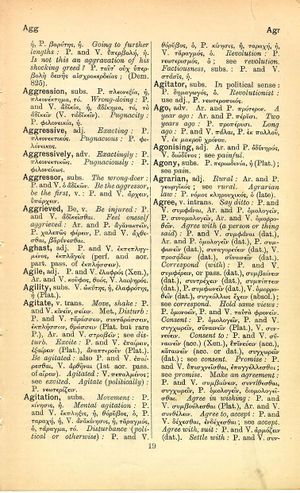aggressor: Difference between revisions
From LSJ
τὸ δὲ ποιεῖν ἄνευ νοῦ ἃ δοκεῖ καὶ σὺ ὁμολογεῖς κακὸν εἶναι: ἢ οὔ → but doing what one thinks fit without intelligence is—as you yourself admit, do you not?—an evil
(1) |
m (Woodhouse1 replacement) |
||
| Line 1: | Line 1: | ||
{{Woodhouse1 | {{Woodhouse1 | ||
|Text=[[File:woodhouse_19.jpg|thumb|link={{filepath:woodhouse_19.jpg}}]] | |Text=[[File:woodhouse_19.jpg|thumb|link={{filepath:woodhouse_19.jpg}}]] | ||
===substantive=== | |||
[[the wrong-doer]]: [[prose|P.]] and [[verse|V.]] [[ὁ ἀδικῶν]]. | |||
[[be the aggressor]], [[be the first]], v.: [[prose|P.]] and [[verse|V.]] [[ἄρχειν]], [[ὑπάρχειν]]. | |||
}} | }} | ||
{{Lewis | {{Lewis | ||
Revision as of 09:09, 20 May 2020
English > Greek (Woodhouse)
substantive
the wrong-doer: P. and V. ὁ ἀδικῶν.
be the aggressor, be the first, v.: P. and V. ἄρχειν, ὑπάρχειν.
Latin > English (Lewis & Short)
aggressor: (adg-), ōris, m. id.,
I one that attacks, an assailant, aggressor (only in the Lat. of the Pandects), Dig. 29, 5, 1 fin.; also for a robber, ib. 48, 9, 7 al.
Latin > German (Georges)
aggressor (adgressor), ōris, m. (aggredior), der Angreifer, bes. als »Räuber«, Paul. sent. 5, 3, 4 u.a. ICt.: nullus fur, nullus aggressor, Augustin. gen. ad litt. 8, 10, 19. Iuvenc. in Matth. 12, 29.
Latin > English
aggressor aggressoris N M :: attacker, assailant

